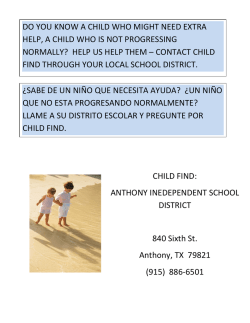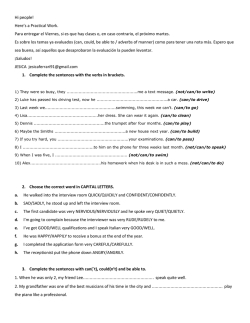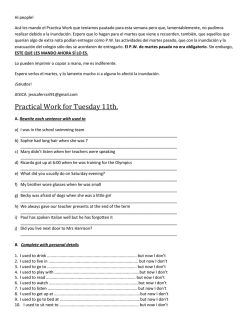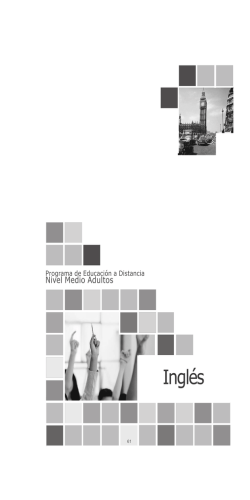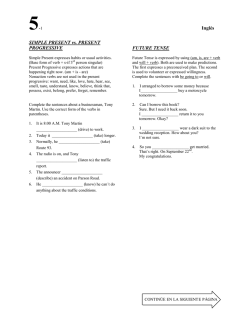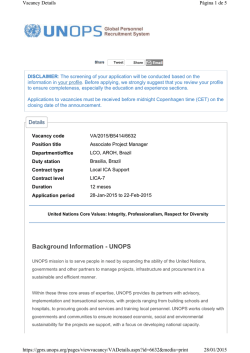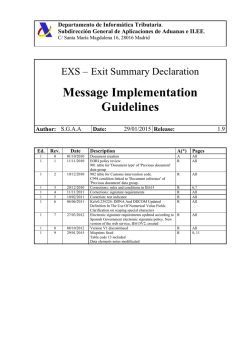
Unidad Uno: ¿Cómo eres y qué recuerdas?
Nombre_____________________________________________ Unidad Uno: ¿Cómo eres y qué recuerdas? In this book you will find vocabulary and activities to help with: -The adjectives of nationality and how they agree with nouns in gender and number -Forming and answering questions using a variety of regular verbs in the present tense -Using adverbs of frequency to talk and write about how often you and your classmates do your favorite activities -Using the present progressive in speaking and writing -Using the formation Ir + a + ______ to write and say where people are going and what they will do when they get there -Describing people’s obligations using the formation Tener + que + infinitives 1 Unit Objectives – What we are going to learn. Check them off as you master each one. Notice: helpful text pages listed ADJECTIVES OF NATIONALITY 1. _____ Identify and use adjectives of nationality, making them agree in number and gender. Realidades 2, (R2), pp. 3, 6, 7, Appendix 2. _____ Generate a list of Spanish-speaking people students know and discuss their nationalities. R2, TE pp. 54-56 3. _____ Discuss perspectives on the use of the word “americano” in the U.S.A. and the Spanish-speaking world. WWW SPANISH I GRAMMAR REVIEW 4. _____ Ask and answer questions using a variety of –ar, -er, -ir, and irregular verbs to become familiar with classmates. R2, pp. 5, 9, 10 5. _____ Use adverbs of frequency to survey classmates on their preferred activities and how often they are done. R2, p. 10 6. _____ Watch a video or look at pictures then describe where people are and what they are doing at the present time (estar + present progressive). R2, p. 504 7. _____ Explain where people go using ir + a + place and what people are going to do using ir + a + infinitive. R2, pp. 11, 42-43 8. _____ Describe people’s interests and obligations using tener + que + infinitive. R2, pp. 15, 22 2 9. _____ Discuss opportunities for students to use Spanish outside the classroom. WWW Este libro contiene... This book contains... Table of contents Página 2 - Unit Objectives Página 3 - Table of Contents Página 4 - _______________________________________ Página 5 - _______________________________________ Página 6 - _______________________________________ Directions: Use these letters to label the correct countries on page 2. These are the adjectives of nationality. Página 7 - _______________________________________ Página 8 - _______________________________________ Página 9 - _______________________________________ Página 10 - _______________________________________ Página 11 - _______________________________________ Página 12 -_______________________________________ _ Página 13 - _______________________________________ Página 14 -_______________________________________ Página 15 - _______________________________________ Página 16 - _______________________________________ Página 17 - _______________________________________ Página 18 - _______________________________________ Página 19 - _______________________________________ Página 20 - _______________________________________ Página 21 - _______________________________________ Página 22 - _______________________________________ Página 23 -_______________________________________ Página 24 -_______________________________________ 3 El vocabulario de unidad uno Ser yo soy tú eres usted es él es ella es nosotros somos vosotros sois ustedes son ellos son ellas son Nationalities of the Spanish-speaking world argentino(a) boliviano(a) chileno(a) colombiano(a) costarricense cubano(a) dominicano(a) ecuatoriano(a) español(a) guatemalteco(a) hondureño(a) mexicano(a) nicaragüense panameño(a) paraguayo(a) peruano(a) puertorriqueño(a) salvadoreño(a) uruguayo(a) venezolano(a) Para decir más canadiense estadounidense norteamericano(a) Regular present tense verbs (-ar) Hablar bailar caminar (con el perro) cantar cocinar comprar dibujar enseñar entrar (en) escuchar 4 yo hablo tú hablas usted habla él habla ella habla nosotros hablamos vosotros habláis ustedes hablan ellos hablan ellas hablan esquiar estudiar ganar hablar (por teléfono) invitar llegar llevar limpiar El vocabulario de unidad uno More regular -ar verbs mirar la película la tele el video montar a caballo en bicicleta en monopatín nadar necesitar pasar (tiempo con amigos) pasear patinar practicar los deportes el esnobordín el snowboard Regular -er verbs Comer yo como tú comes usted come él come ella come sacar(fotos) terminar tocar (los instrumentos) tomar trabajar usar (la computadora) viajar visitar alquilar andar ayudar (a) buscar cazar contestar esperar levantar (pesas) manejar pasear nosotros comemos vosotros coméis ustedes comen ellos comen ellas comen correr creer deber leer vender aprender beber comer comprender Regular -ir verbs Vivir abrir compartir decidir escribir (cuentos) yo vivo tú vives usted vive él/ella vive nosotros vivimos vosotros vivís ustedes viven ellos/ellas viven recibir subir (montañas / piedras) vivir 5 El vocabulario de unidad uno Los interrogativos ¿De dónde? ¿Dónde? ¿Qué? ¿Quién(es)? ¿Por qué? Porque ¿Adónde? ¿Con quién(es)? ¿Cómo? ¿Cuál(es)? ¿Cuándo? ¿Cuánto/a(s)? Los adverbios de frecuencia ahora a veces frecuentemente los lunes, los martes, etc. mucho nunca poco siempre también todos los días El verbo ir Ir yo voy tú vas usted va él va ella va nosotros vamos vosotros vais ustedes van ellos van ellas van Ir + a + _________ Verbos con ir ir a la escuela ir de camping ir de compras ir de pesca 6 a menudo cada día de vez en cuando el fin de semana los fines de semana generalmente rara vez jamás muchas veces The Pledge of Allegiance El vocabulario de unidad uno El verbo estar y los paticipios presentes (gerunds) Estar yo estoy tú estás usted está él está ella está -ar verbs -ando andar - andando dormir – durmiendo En la escuela la biblioteca el baño Otros lugares el baile el café el campo la cancha la casa (en casa) el centro comercial el cine la ciudad el concierto nosotros estamos vosotros estáis ustedes están ellos están ellas están -er verbs -iendo beber - bebiendo creer – creyendo -ir verbs -iendo vivir - viviendo leer – leyendo la cafetería la clase el gimnasio la oficina el estadio la fiesta la iglesia las montañas el parque el partido la piscina la playa el restaurante el río el trabajo El verbo tener Tener yo tengo tú tienes usted tiene él tiene ella tiene nosotros tenemos vosotros tenéis ustedes tienen ellos tienen ellas tienen Tener + que + infinitivo Verbs with irregular “yo” forms hacerhago salir salgo venir vengo ver veo Dos usos de hacer hacer caminatas hacer ejercicio 7 País, capital y nacionalidad 8 Hispanohablantes Famosos Directions: With a partner make a list of at least 10 different famous Spanish speakers. Once you’ve made your list, turn it into grammaticaly correct sentences about the people stating their nationality using the adjective of nationality from page 4. Then add one more sentence about each person that describes their personality and physical characteristics. Ex. Penolope Cruz es española. Ella es guapa e inteligente. 1. 2. 3. 4. 5. 6. 7. 8. 9. 10. 9 -AR mapa de verbos PULVERIZAR 10 -ER mapa de verbos ROMPER 11 -IR mapa de verbos SURGIR 12 Una entrevista con persona famosa Directions: Your assignment is to form interview questions for a famous person by combining one or more -ar, -er, or -ir verb with 8 of the interrogatives from page 6 of this librito. An example of the question with “Adónde” could be… ¿Adónde vas cuando viajas? (To) Where do you go when you travel? You have to leave a space after each question because when you are done you’ll find a partner to pretend to be the famous person and write a complete sentence answer. 1._______________________________________________________ _________________________________________________________ 2._______________________________________________________ _________________________________________________________ 3._______________________________________________________ _________________________________________________________ 4._______________________________________________________ _________________________________________________________ 5._______________________________________________________ _________________________________________________________ 6._______________________________________________________ ________________________________________________________ 7._______________________________________________________ ________________________________________________________ 8.___________________________________________________ ____________________________________________________ 13 Organizamos las actividades con adverbios de frecuencia de vez en cuando muchas veces los fines de semana cada día generalmente rara vez poco nunca siempre por la mañana 14 los lunes a los viernes por la noche Directions: Use your verb lists in this book to name at least 3 actions you do at the frequency indicated in each box. Be sure to conjugate the verbs to the “yo” form. Crucigrama de conjugacion Directions: Make a crossword with at least 16 entries. The entries have to be conjugated present tense verbs without the subject pronouns. (Ex. trabajamos). The hints have to be the correct subject pronoun in front of the infinitive. (Ex. Nosotros trabajar). Use the space below for your key. Remember you need a minimum of 16 entries. Don’t forget these steps: 1) Use a pencil first. 2) Number your words and hints with a pen. 3) Make a border. 4) Then erase your penciled-in answers but not the numbers or border. 15 Gramática del presente del progresivo 16 Escribir con el presente del progresivo 17 Describimos lo que vemos pasando 18 Usos del verbo IR 19 Canción: ¿Dónde estás y adónde vas? Estrofas nuevas 20 Usos de tener 21 Práctica con tener 22 ¿Qué tienen que hacer tus amigos? 23 “Campesino” Por los Gypsy Kings Campesino No te vayas tu de mi No te vayas por favor No te vayas tu de mi El mundo seria en flor Un mundo mejor Campesino Campesino Campesino sono yo Campesino Campesino Campesino sono yo Que campesino que campesino Que campesino que sono yo Que campesino que campesino Que campesino que sono yo No te vayas por favor No te vayas tu de mi No te vayas por favor Un mundo sera mejor Un mundo en flor compaÑeros del horario 1:00 2:00 3:00 4:00 5:00 6:00 lugar (place)_________________________ hora (time) ________ fecha(date)________ lugar (place)_________________________ 24 hora (time) ________ fecha(date)________ 7:00 8:00 9:00 10:00 11:00 12:00
© Copyright 2026
